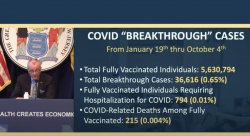Dr. Stephanie Silvera Remarks on Risk Reduction Behaviors
Colin Powell’s death puts spotlight on breakthrough cases. N.J. data shows they are rare.
Posted in: College News and Events, Master of Public Health News, Public Health

Breakthrough COVID-19 cases are getting attention in the wake of the death of Colin Powell, the former U.S. secretary of state and chairman of the Joint Chiefs of Staff.
Powell’s family said he died from complications from the coronavirus. He was fully vaccinated but also had multiple myeloma, a form of blood cancer, the family said. New Jersey Gov. Phil Murphy said at his Monday coronavirus briefing that Powell’s death is putting a “bright spotlight on breakthrough infections and deaths.”
Dr. Stephanie Silvera, Professor in the Public Health Department, said the Powell case is an example of why “it is so important for all of us to do everything we can to reduce transmission and keep community rates low so that we can protect the most vulnerable around us.”
“Even with that, like most things in life, we are not talking about risk elimination. We are talking about risk reduction,” Dr. Silvera said. “Yes, there will be a small number of people who will still become infected and an even smaller number who will develop severe illness and some who will die, but those numbers are much, much smaller than they are among the unvaccinated.”
“Parachutes have fail rates too, but I wouldn’t recommend jumping out of a plane without one because they aren’t effective 100% of the time,” she said.
